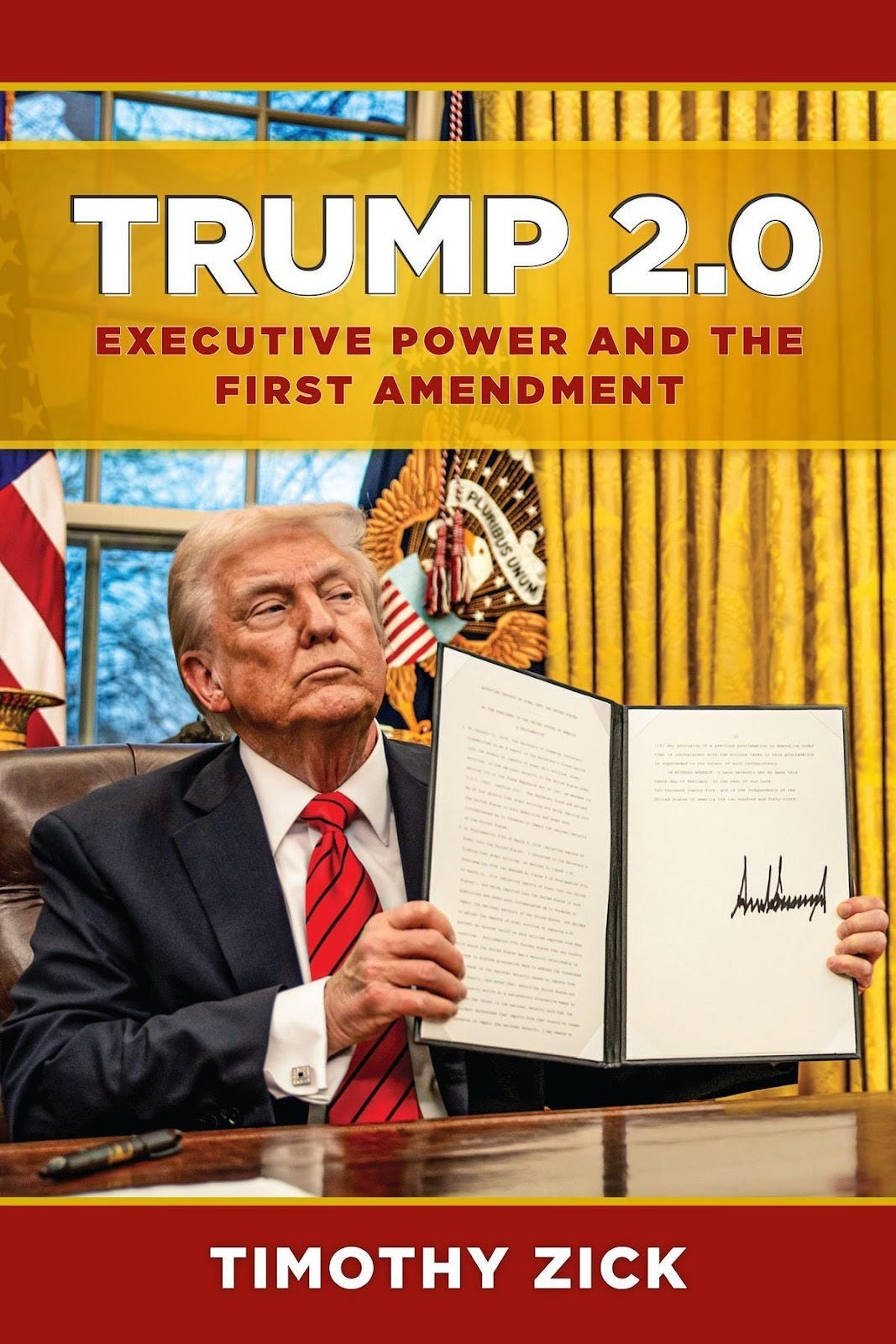Thoughts on creative free-speech expression
First Amendment News 493
The first sight visitors may get on their way into Bloomington is a billboard accusing Indiana University of a cover-up.
— Ethan Sandweiss (Indiana Public Media, Nov. 10)
I cannot say it enough: The First Amendment is more than what lawyers and judges do; it is also about how We the People exercise that right. By that measure, something is to be said about creative expression, which sometimes can be more effective than litigation.
Case (or should I say, “picture”) in point:
Don’t you just love it? I mean, poking a thumb in the eye of a free speech abridger? Such signs can sometimes be more effective than ten stacks of court filings. And the folks at FIRE know that as they continue their creative free speech campaign against Indiana University over its campus speech codes and practices. This campaign comes against the following backdrop of events:
Indiana University has a free speech crisis — and it’s only getting worse.
Last year, administrators deployed police snipers to oversee peaceful protesters. This year, they fired the director of student media for refusing to censor the campus newspaper.
In between, IU has silenced student groups, suspended faculty critics, canceled art exhibits, and shuttered campus events from every side of the political spectrum. Whether you’re conservative or liberal, pro-Palestinian or pro-Israel, or simply a journalist doing your job, IU’s message is the same: Shut up, or pay the price.
No wonder IU now ranks near the very bottom of FIRE’s College Free Speech Rankings — 255 out of the 257 schools surveyed — earning abysmal scores in openness, administrative support, and comfort expressing ideas. In fact, it’s the worst-ranked public school in America. Faculty don’t trust the administration to protect academic freedom. Students fear speaking their minds. The university is being sued for firing its student newspaper advisor after he stood up for free speech. And the eyes of the nation are watching.
Some administrators and government officials are not troubled by First Amendment lawsuits; they’re more than happy to waste public money to defend their unconstitutional behavior. Plus, it puts the free speech burden on those opposing their suppressive actions.
“Bring it on” is their mantra — until some group lights a fire under them by “billboarding” their reprehensible conduct and policies.
For all of her cagey ways, IU President Pamela Whitten (a communication studies scholar!) seems to have gotten the message — FIRE’s billboard message. Writing for the Indianapolis Star, Cate Charron reported:
As Indiana University navigates a host of First Amendment controversies and criticisms, President Pamela Whitten is asking the faculty council to consider installing a set of guiding principles regarding how the university upholds its free speech environment.
So, take heed: Be creative in speech and dissent. Think outside the law box; think in ways that enhance free speech values by exercising your First Amendment rights creatively.
Signs like FIRE’s billboards are a good sign for free speech.
Related
Ethan Sandweiss, “IU lecturer removed from class during intellectual diversity investigation,” Indiana Public Media (Nov. 7)
“Paths to protests: Gloria Browne-Marshall’s revealing new book,” FAN 478 (Jul. 17)
“Court Halts Indiana University’s ‘Expressive Activity’ Policy Over First Amendment Complaint,” ACLU (May 29)
A few words on certainty, risk, and free speech
Ronald K.L. Collins, “‘And Yet It Moves’—The First Amendment and Certainty,” University of Washington School of Law
Contrariness makes for a better First Amendment fit than certainty. The ability to be torn, to hold opposing ideas at the same time, is a necessary condition for forthright thinking. To reconsider, reformulate, reinvent, and rearticulate one’s thought allows it to evolve beyond the rigid constraints of certainty.
[. . .]
To be a free people is to take risks. We cannot have genuine liberty if we cling to safety like children terrified of the dark. Free speech scholars may frighten us with the sky-is-falling scenarios, while contextualist balancers echo that theme in opposition to reaffirmations of free speech freedom. In that world, censors tempt us with promises of security. But in the end, it is too often a false promise. For little worth safeguarding is truly gained if liberty is the altar on which such sacrifices are made. Brandeis had it right: The First Amendment was made for a courageous people. And to be courageous means taking risks, which in turn sometimes means forsaking the security of collective certainty.
Trump Administration cannot fine or terminate U.C.’s federal funding
“Judge Indefinitely Bars Trump From Fining University of California Over Alleged Discrimination,” First Amendment Watch (Nov. 17)
The Trump administration cannot fine the University of California or summarily cut the school system’s federal funding over claims it allows antisemitism or other forms of discrimination, a federal judge ruled late Friday in a sharply worded decision.
U.S. District Judge Rita Lin in San Francisco issued a preliminary injunction barring the administration from cancelling funding to UC based on alleged discrimination without giving notice to affected faculty and conducting a hearing, among other requirements.
The administration over the summer demanded that the University of California, Los Angeles, pay $1.2 billion to restore frozen research funding and ensure eligibility for future funding after accusing the school of allowing antisemitism on campus. UCLA was the first public university to be targeted by the administration over allegations of civil rights violations.
It has also frozen or paused federal funding over similar claims against private colleges, including Columbia University.
In her ruling, Lin said labor unions and other groups representing UC faculty, students and employees had provided “overwhelming evidence” that the Trump administration was “engaged in a concerted campaign to purge ‘woke,’ ‘left,’ and ‘socialist’ viewpoints from our country’s leading universities.”
Knight Institute and AAUP contest ‘ideological deportation’ policies
Dora Gao, “Knight Institute and AAUP file motion to block Trump administration from deporting pro-Palestinian protesters,” Columbia Spectator (Nov. 16)
The Knight First Amendment Institute at Columbia, the American Association of University Professors, and the Middle East Studies Association filed a motion on Monday asking a federal judge to block what they describe as President Donald Trump’s administration’s “ideological deportation” policy targeting pro-Palestinian advocates.
In the filing, the plaintiffs argue that the Trump administration’s policy allows immigration officials to deny entry or deport non-U.S. citizens based on their political beliefs. The deportations and entry denials, the plaintiffs argue, have created what they describe as a “chilling effect” on academic freedom and international exchange.
The case, first filed in March 2025, went to trial in July. The Monday filing comes five weeks after U.S. District Judge William G. Young’s landmark ruling on Sept. 30, which argued that the Trump administration’s “conduct violated the First Amendment.”
The ruling marked one of the most direct legal challenges to the Trump administration’s treatment of student protesters. The Sept. 30 decision held that non-U.S. citizens “lawfully present here in the United States have the same free speech rights as the rest of us,” striking down the federal government’s efforts to deport students and faculty for participating in pro-Palestinian protests.
Paulson criticizes TN book-banning policy
Ken Paulson, “Tenn. official’s order undermines our public libraries,” Free Speech Center (Nov. 17)
[I]t’s so disheartening to see the undermining of public libraries by Tennessee Secretary of State Tre Hargett, who sent a letter ordering Rutherford County libraries to identify any materials in their children’s collections that may be inconsistent with “Tennessee’s age-appropriateness laws” or President Donald Trump’s January executive order regarding “gender ideology,” according to The Tennessean.
The result: The Smyrna Public Library posted an “emergency closure notice,” closing the branch from Nov. 10-15 to “meet new reporting requirements from the TN State Secretary’s Office … for the purpose of reviewing inventory.” The Murfreesboro library will be closed Nov. 17-21 for the same purpose.
Think about that. The government is shutting down taxpayer-supported facilities because it regards some ideas as too dangerous for operations to continue before the shelves are scoured.
Coming next month: Zick on executive power and the First Amendment
Tim Zick, “The First Amendment Lessons of Trump 2.0,” Thoughts on the First (Nov. 18)
I am putting the finishing touches on my forthcoming book, Trump 2.0: Executive Power and the First Amendment, which will be published by Carolina Academic Press next month. If you had told me in January that I’d have enough material for a book after only about 10 months of Trump’s second term, well I’d have believed you: I published my first Trump/First Amendment book halfway through Trump’s first term.
The second Trump term has already been the most impactful era for First Amendment freedoms since the McCarthy “Red Scare” of the 1950s. My forthcoming book records and organizes the torrent of executive orders and administrative actions that have already significantly affected First Amendment rights during the second Trump term. More importantly, it offers a vehicle for learning how law firms, universities, scientists, libraries, broadcasters, and others have responded to threats to those rights in real time. It asks, broadly speaking, how the First Amendment has performed as a check on aggressive and in many cases unprecedented exercises of executive power.
The book uses judicial decisions, agency letters, pleadings, and other materials to analyze how the current administration’s exercise of executive power has affected First Amendment rights. This is not an “academic” monograph, but rather a resource that focuses on the real world application of First Amendment principles and doctrines to uses and abuses of executive power. The book facilitates learning through doctrinal synopses, discussion notes, and problem exercises. For example, one chapter problem exercise asks how you would represent Bruce Springsteen (“The Boss”) in a threatened investigation by the administration for alleged violations of campaign finance laws. Although primarily intended for classroom use, anyone who values First Amendment freedoms will find the materials useful in terms of processing the torrent of First Amendment conflicts and concerns of our present era.
New book, edited by Bollinger and Stone, on campaign finance decisions and reforms
Lee Bollinger and Geoffrey Stone, eds., “Money, Politics, and the First Amendment: Fifty Years of Supreme Court Decisions and Campaign Finance Reforms,” Oxford University Press (March 20, 2026)
Money in political campaigns is a subject of endless current interest and enormous consequence for American democracy.
Beginning in 1976, in Buckley v. Valeo, the Supreme Court established a framework for public campaign regulation that declared that money constitutes “speech” and that the only constitutional basis upon which the government can regulate money was to prohibit corruption or the appearance of corruption. The Court then defined corruption narrowly and held that direct “contributions” to candidates could be limited on that basis, but that “expenditures,” by political candidates and others, could not.
Over time as the role of money became more and more serious in politics the Court in a number of decisions seemed to be turning more willing to accept regulation. But in Citizens United v. Federal Election Commission, the new conservative Supreme Court sharply turned against permitting regulation, including of corporations.
Today that regime of nearly full protection for anyone spending virtually any amount of money for or against candidates and issues remains securely in place. The question, after half a century of this system, is whether this interpretation of the First Amendment is sound or not. If yes, then what are the justifications and what will be the consequences? If not, then what are alternative interpretations and what would the world be like under each one?The contributors, all scholars and experts in this area, give their interpretations and proposals.
Forthcoming scholarly article on First Amendment independent appellate review
Courtney Douglas, “Independent Appellate Review and the First Amendment,” Boston College Law Review (Forthcoming, 2026)
First Amendment independent appellate review, now known as the Constitutional Fact Doctrine, calls on federal appellate courts to review de novo facts that strike at the heart of speech freedom claims. Yet the doctrine’s scope is underdefined, and the Court has never explained why, exactly, speech deserves this special protection.
In search of the Constitutional Fact Doctrine’s missing normative underpinnings, this Article recovers its overlooked origin story. This Article traces the doctrine’s roots not to early speech cases, but rather to capital criminal appeals brought to the Supreme Court predominantly by Black men sentenced to death for rape and murder in Southern states. The Supreme Court recognized the egregious equal protection and due process violations these petitioners suffered only by refusing to defer to lower courts’ factual findings in those cases. The doctrine migrated to the First Amendment realm in the 1960s through racial civil rights cases.
This evolution suggests that the Constitutional Fact Doctrine was never motivated by an abstract reverence for speech. Instead, it sought to address entrenched inequities and to safeguard democratic principles.
To that end, this Article proposes a new, more focused framework for applying independent appellate review in the First Amendment context. Courts should apply the doctrine (1) when it advances democratic interests weakened by structural forces or (2) when it resolves factual questions entangled with complex doctrinal standards. The Article applies this approach to the growing circuit split over the standard of review for true threats determinations and ultimately argues that independent appellate review is not warranted in that context.
This Article aims to align independent appellate review with its foundational purpose: ensuring that fundamental constitutional rights-including speech freedom-are vindicated with fairness and a pragmatic attention to power.
So to Speak: FIRE’s London and Fitzpatrick on conversion therapy case and more
“Conversion therapy at the Supreme Court,” So to Speak (Nov. 13)
FIRE’s Ronnie London and Conor Fitzpatrick join the show to discuss the Supreme Court’s oral argument in the conversion therapy case, the Pentagon’s new press rules, Indiana University’s censorship rampage, and where the situation stands with visa and green card holders who say things the feds don’t like.
More in the news
Eugene Volokh, “Friend-of-the-Court Brief in Massachusetts’ Social Media Addiction Lawsuit Against Instagram,” The Volokh Conspiracy (Nov. 17)
“Judge denies Florida Fish and Wildlife biologist’s reinstatement after firing over Charlie Kirk post: ‘First Amendment is not absolute’,” CBS News (Nov. 14)
Eugene Volokh, “Again with the Heckler’s Veto in a Government Employee Speech Case,” The Volokh Conspiracy (Nov. 14)
“NEW HIGH: 3/4 of Americans say free speech is headed in the wrong direction,” FIRE (Nov. 13)
“George Mason demands pro-Palestinian student group remove video from social media, but public universities can’t do that,” FIRE (Nov. 13)
Alex Nguyen, “Texas ban on sexually explicit drag shows can be enforced, federal appeals court rules,” The Texas Tribune (Nov. 6)
2025-2026 SCOTUS term: Free expression and related cases
Review granted: four cases
Chiles v. Salazar (argued Oct. 7)
Olivier v. Brandon (to be argued Dec. 3)
First Choice Women’s Resource Centers, Inc. v. Platkin (to be argued Dec. 2)
National Republican Senatorial Committee v. Federal Election Commission (to be argued Dec. 9)
Pending petitions
Emergency docket (“Shadow docket”)
Petitions denied
Last Scheduled FAN
This article is part of First Amendment News, an editorially independent publication edited by Ronald K. L. Collins and hosted by FIRE as part of our mission to educate the public about First Amendment issues. The opinions expressed are those of the article’s author(s) and do not necessarily reflect the opinions of FIRE.







